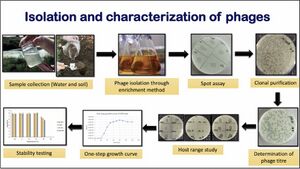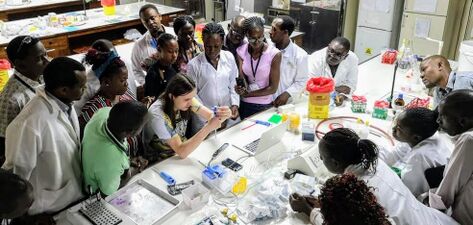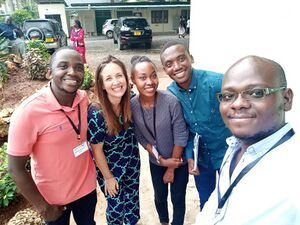Combating Antibiotic Resistance in Africa and Asia: Difference between revisions
(Created page with "{{Project |Description=COVID-19 caused 3.55 million deaths globally in 2021, but antibiotic resistant bacterial infections actually killed 4.95 million people in 2019 - and that number is expected to be 10 million by 2050. Thus we urgently need antibiotic alternatives, particularly in Africa and Asia where 90% of the antibiotic-resistant deaths will occur. Phages for Global Health empowers scientists in Africa and Asia to develop inexpensive, natural antibacterials (phag...") |
No edit summary |
||
| Line 17: | Line 17: | ||
# https://www.youtube.com/watch?v=KQDiwCyyFII | # https://www.youtube.com/watch?v=KQDiwCyyFII | ||
# https://www.youtube.com/watch?v=YI3tsmFsrOg | # https://www.youtube.com/watch?v=YI3tsmFsrOg | ||
=Project Gallery= | |||
|Problems=43713 | |Problems=43713 | ||
Revision as of 19:58, 23 May 2023
| Organization | Phages for Global Health |
|---|---|
| Region | Malaysia |
| Website | Website |
| N/A | |
| N/A | |
| ProjectLeader | Tobi Nagel |
| Linked Problems & Solutions
|
|---|
Antibiotic-resistant infections are predicted to kill 10 million people each year by 2050 -- five times more than the roughly 2 million deaths caused by COVID-19 in 2020. Thus, we urgently need antibiotic alternatives, particularly in Africa and Asia where 90% of the antibiotic-resistant deaths will occur. Phages for Global Health empowers scientists in Africa and Asia to develop inexpensive, natural antibiotic alternatives (phages) that can kill antibiotic-resistant bacteria.
Challenge
The antibiotic resistance crisis disproportionately impacts developing countries, and misuse of antibiotics in COVID-19 patients is expected to increase antibiotic resistance rates worldwide. Before antibiotics were discovered, phages were used as antibacterial agents. With few other treatment options available now, phage-based drugs are regaining popularity in industrialized nations, but most researchers in developing countries lack the expertise to develop and utilize them effectively.
Long-Term Impact
Since 2017 we have delivered 4 in-person workshops in Africa, teaching scientists how to isolate phages. Those trainees have now started >50 phage research projects, won grants totaling to >$945,000, and taught phage biology to 1200 others -- rapid scaling! In 2022 we will run our first virtual workshop, specifically for scientists in Southeast Asia. Since phages can kill antibiotic-resistant bacteria in food, livestock and people, all this work could save thousands of lives, if not millions.
References
- http://phagesforglobalhealth.org/
- https://www.theguardian.com/global-development/2020/sep/21/phages-the-tiny-viruses-that-could-help-beat-superbugs
- https://www.youtube.com/watch?v=KQDiwCyyFII
- https://www.youtube.com/watch?v=YI3tsmFsrOg
- https://www.ncbi.nlm.nih.gov/pmc/articles/PMC4897794/pdf/fmicb-07-00882.pdf
Additional Documentation
https://www.ncbi.nlm.nih.gov/pmc/articles/PMC4897794/pdf/fmicb-07-00882.pdf
Project Gallery




